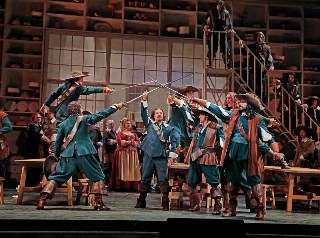|
Back
Long Nosed Flop New York
Metropolitan Opera
05/02/2017 - & May 6, 10, 13, 2017
Franco Alfano: Cyrano de Bergerac
Roberto Alagna (Cyrano), Jennifer Rowley (Roxane), Atalla Ayan (Christian), Juan Jesús Rodriguez (de Guiche), Roberto de Candia (Ragueneau), David Pittsinger (Le Bret), Paul Corona (Lignière), Tony Stevenson (Montfleury), Hyung Yun (Vicomte de Valvert, The Spanish official), Michael Todd Simpson (Carbon), Jennifer Roderer (Duenna), Holli Harrison (Lisa, A lay sister), Edyta Kulczak (Marta), Edward Albert (A cook), Edward Hanlon (A musketeer), Gregory Warren, Juhwan Lee (Sentinels)
The Metropolitan Opera Chorus, Donald Palumbo (chorus master), The Metropolitan Opera Orchestra, Marco Armiliato (conductor)
Francesca Zambello (production), Peter J. Davison (set designer), Anita Yavich (costume designer), Natasha Katz (lighting designer), Thomas Baird (choreographer)

(© Ken Howard)
Franco Alfano rarely stirs the imagination as an operatic genius. As a composer he is best known for only one minor feat in the history of music: composing the final music of Giacomo Puccini’s Turandot, which was left unfinished at the time of the latter composer’s death in 1924. But Alfano also wrote a rather large body of his own work, now all but forgotten. Only his Cyrano de Bergerac, adapted from Rostand’s famous play, seems to have withstood the test of time, initially as a vehicle for the once celebrated tenor Roberto Alagna, who campaigned for its revival with himself in the lead role.
Alagna’s advocacy did not quite work out at the Metropolitan Opera, where Cyrano entered the repertoire in 2005 with superstar tenor Plácido Domingo in the title role. But a dozen years later, with Domingo now inhabiting baritone parts and orchestra pits (he has been conducting Mozart’s Don Giovanni consecutively with this run), Alagna has his chance in this short run of four performances.
As a vehicle for a star, Alfano’s opera is an understandable choice. Cyrano, whose long nose makes him too self-conscious to pursue his beloved Roxane, must balance his hopeless adoration of her with his poetic assistance for his friend Christian, who successfully uses Cyrano’s words to woo her only to die on the battlefield. Despite Christian urging that Cyrano reveal his true identity as the author of Roxane’s seduction, Cyrano holds back for many years, until he comes to her mortally wounded and she divines his secret. In true operatic form, the tenor lead thus gets a sympathetic situation, heartbreaking music, dramatically mixed emotions, and all the other great stuff of tragedy. Yet in operatic form, the story necessary deprives the audience of Rostand’s poetic gifts. The comedic timing, extravagant wit, hilarious puns, and rapier exchanges that make Cyrano such a bitter hero do not translate as well into music as they do into other media, as one can see in the great Cyrano films starring José Ferrer (1950) and Gérard Depardieu (1990). The opera tells the story, but it makes Cyrano into too much of a fool and, at times, even unsympathetic.
Francesca Zambello’s production is fairly traditional fare, which is probably inescapable given how iconic the characters and their setting are. Alagna sang well, but nothing close to the star potential he may once have commanded. High notes were pinched, and the voice sounded nasally. But dramatically he still conveyed what he could with the title part. Soprano Jennifer Rowley’s Roxane was a revelation. Excellent control gave her ascents an effortless quality, equally at home in the solo moments and ensembles. Atalla Ayan’s solid baritone delivered Christian’s music with well-rounded tones, marking him as another young artist to watch. Juan Jesús Rodriguez’s de Guiche was suitably pompous. Marco Armiliato conducted without great flair, but with whatever balance the performance needed, but it is hard to imagine that this opera will return any time soon.
Paul du Quenoy
|